
St. Mary's Standout McLaurin Becomes Chinese Football Pioneer
By
Tom Markowski
Special for Second Half
August 19, 2021
The eight years Chris McLaurin spent in China not only changed his life, but they changed the perception of American football in China and elsewhere – and just may have opened the door to a whole new market.
 We're talking “American football,” not soccer. Most of us are familiar with NFL Europe, but NFL China? Not so much.
We're talking “American football,” not soccer. Most of us are familiar with NFL Europe, but NFL China? Not so much.
When McLaurin went to China in 2011, the thought of teaching the locals American football never occurred to him. He went there to work for a private company, and circumstances just seemed to fall in place.
Some might say McLaurin was in the right place at the right time, but it can also be said he was the right person at the right time to lead this undertaking. McLaurin had the background, both athletically and organizationally, to take on such an endeavor.
“I met a lot of people who were interested in football,” McLaurin said. “I thought, football? I had a limited understanding of what they knew. I was very surprised they would reach out to me. I quickly found out they were hungry to learn.”
A 2005 graduate of Orchard Lake St. Mary's, McLaurin started at tight end and linebacker, and helped the Eaglets reach the MHSAA Division 2 Final in 2004 (where they lost to Muskegon). McLaurin went on to play four seasons at Michigan and graduated in 2009 with a degree in history and minor in urban and community studies. He had thoughts of entering law school when other opportunities interceded.
During his time in Ann Arbor, McLaurin worked with an organization that focused on disadvantaged youth in the area and helped open doors for them. They were allowed to attend lectures at the university as well as sporting events.
Upon graduation, the seeds that would blossom in Asia began being sown in other parts of the world.
McLaurin received a Fulbright Scholarship and went to Johannesburg, South Africa, to work with underprivileged youth as part of a program called Tomorrow Trust. During this time he worked with the United Nations Development Programme and Harvard Law School in their pursuit of promoting economic rights for the poor.
Following his work in South Africa, McLaurin began his post-graduate work at the London School of Economics. He earned his degree after working in the House of Commons and as a research assistant for the Runnymede Trust. Then came a six-month internship within the Obama Administration as part of the White House Domestic Policy Council.
And after that, he was off to Chongqing in western China to work for a private equity company as a project manager. Two years later, he started his own company in addition to a non-profit organization. Much of his work centered on the automobile industry and global technology.
During this time he learned to speak Mandarin and, in doing so, was introduced to more of the local customs – including American football.
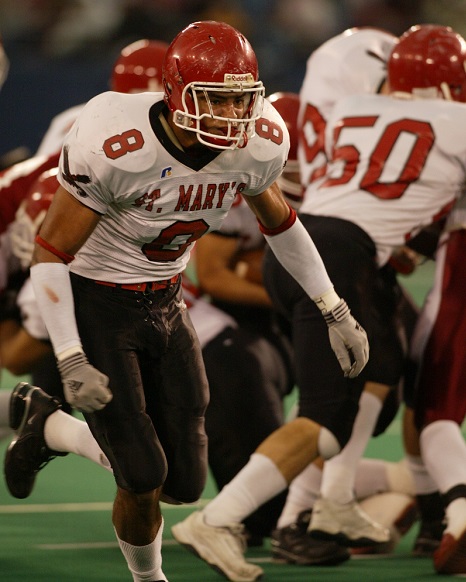 What McLaurin found was a rudimental brand of football, what we would term a recreational type of competition. McLaurin began his involvement gradually, on weekends.
What McLaurin found was a rudimental brand of football, what we would term a recreational type of competition. McLaurin began his involvement gradually, on weekends.
“After that first year (2012), I took it up a notch,” McLaurin said. “We started recruiting players and bought new equipment. They watched football on TV, but it's not an easy game to understand. You have to play football to learn it. You don't get that from watching TV.”
A year of training, recruiting and, yes, some frustration, led McLaurin to start a league, the American Football League of China (now known as the China National Football League). The rules are similar to those at the U.S. college level. There are 11 players a side, and when a ball carrier's knee touches the ground the play is over.
In the beginning “it was successful,” he said. “There were no leagues when I got there. There was no one to organize it. We went from (fewer than) 10 teams to, 3-to-4 years later, there are 80-90.”
McLaurin quickly learned he needed help if this adventure was to succeed. USA Football had a footprint in Shanghai, and McLaurin reached out to the organization. McLaurin contacted a handful of former teammates including Prescott Burgess and Morgan Trent for advice. Former NFL player Bruce Plummer and NFL coach and scout Jerry Hardaway worked some of the camps and clinics with McLaurin and added much-needed experience and expertise.
After playing at Southern Illinois, Hardaway’s first coaching position was at Memphis State as an assistant, and then he went to Grambling State to coach under the legendary Eddie Robison for six seasons. He also coached at the University of California under Joe Kapp prior to working in the NFL and then heading to China.
“I was told, through another guy, that (McLaurin) needed some help,” Hardaway said. “It was all about getting back to basics. That's what made it fun. They had no clue when you'd say to them, control the ground at impact when you're making a block. They had no idea of the terms that you'd use. To see the young kids, to see on their faces, they were absorbing everything.
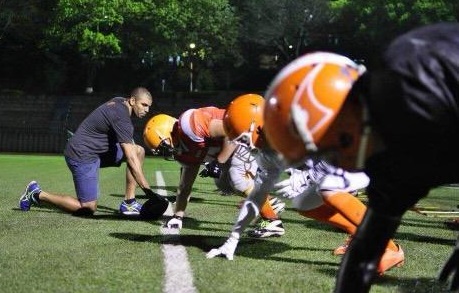 “Yes, yes, yes, it was worthwhile. First of all, people had no clue about what it takes to do something like this. They were learning. Some of the parents thought it was a violent sport. That's what they heard. Then they switched. They saw me, us, teach the basics and they saw what we were doing. For me, it gave me a sense, like hey, you have to teach and you have to enjoy it.”
“Yes, yes, yes, it was worthwhile. First of all, people had no clue about what it takes to do something like this. They were learning. Some of the parents thought it was a violent sport. That's what they heard. Then they switched. They saw me, us, teach the basics and they saw what we were doing. For me, it gave me a sense, like hey, you have to teach and you have to enjoy it.”
Soon after that first season, the NFL got involved as did the National Committee on United States - China Relations. McLaurin credits the NFL for advising him on the business end of starting a new league and structuring. After 18 months, McLaurin got out of coaching and became the commissioner.
“(The NFL) wanted to expand,” he said. “They saw how their brand was quite low (in China). China is a natural.”
Progress was slow, but it was still progress. The 2015 championship game was played in Shanghai, and McLaurin estimates it drew 3,500 spectators.
He continued to work with the AFLC through 2019 but then decided to make a career move. He returned to the U.S. and, this fall, is pursuing a dream he's held since leaving U-M. At age 34, McLaurin entered Harvard Law School.
“When I started, the last thing we wanted was a U.S. version of football,” he said. “We wanted it to be Chinese football. There were limitations on how many foreigners would compete. At first it was five (per team), then three. We wanted it to be a Chinese experience."
2020-21 Made in Michigan
August 5: Herremans' Focus on 'Dadding,' Giving Kids Similar Small-Town Childhood - Read
July 29: Loy Norrix Career Prepped Crocker for U-M Success, Law Degree Pursuit - Read
July 19: Top PGA Pro Finish Latest Greatest Highlight as Cook Continues Climb - Read
July 16: TC West Standout Renews Ties to Titans, Cheers Past Teammates' Gold Pursuit - Read
July 8: Caro Champs Find Common Ground Again as Mental Health Providers - Read
June 28: Michigan's Minor Leaguers Making Up for Lost Season - Read
PHOTOS: (Top) Former Orchard Lake St. Mary's standout Chris McLaurin started an American football league in China and remained part of its leadership through 2019. (Middle) McLaurin was a two-way starter for St. Mary's 2004 Division 2 runner-up team. (Below) McLaurin runs drills for one of the Chinese teams. (Top and below photos courtesy of Chris McLaurin; middle photo from MHSAA archives.)
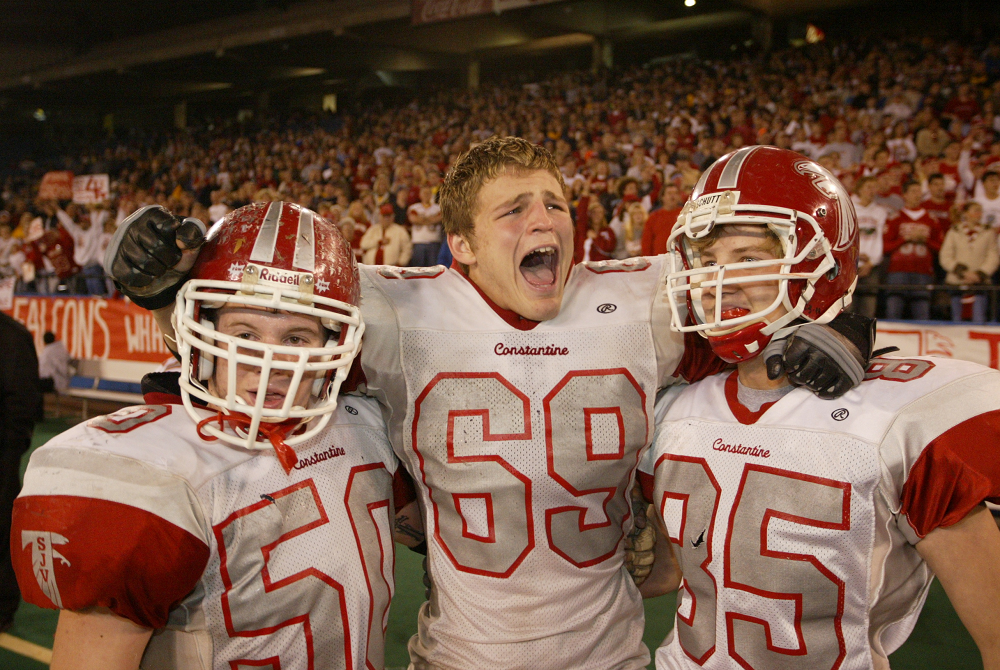
Constantine Celebrates 100th Season, Renowned for Continuity & Signature Wing-T
By
Scott Hassinger
Special for MHSAA.com
September 6, 2023
CONSTANTINE – Bennett Vandenberg and Cohen McGee are just like any other high school football players.
 Both Constantine seniors have high aspirations of winning a fifth-straight Southwestern Athletic Conference Lakeshore title and reaching the postseason.
Both Constantine seniors have high aspirations of winning a fifth-straight Southwestern Athletic Conference Lakeshore title and reaching the postseason.
But Vandenberg and McGee, along with their Falcons teammates, will be celebrating more than victories and a potential playoff appearance this fall.
Constantine, a community located in southern St. Joseph County, is observing the 100th season of the school's football program.
The Falcons (1-1) will commemorate the occasion Saturday, Oct. 7, with a home game against SAC Lakeshore foe Kalamazoo United. Kickoff time from Sweetland Stadium is 1 p.m. The game will be followed by a community luncheon and program in the high school at which time past coaches, players and the program's biggest accomplishments will be recognized and celebrated.
Vandenberg, a starting fullback/tight end and outside linebacker, and McGee, an offensive lineman and linebacker, are both looking forward to the rest of the season and continuing Constantine's strong tradition on the gridiron.
"We have a huge football tradition here at Constantine. This year we're celebrating the 100th year, and we have some of the oldest living players coming back to help celebrate after that game with United,” said Vandenberg, a three-year starter and Finals placer his junior year in wrestling and track & field. “Our community is all about football. We know we have to go out there and represent our school and community the right way."
McGee is following in the footsteps of his older brother Carter.
"There are lots of things that people who follow Constantine football don't see, like the hours of dedication and work we put in during the offseason. That's where we make our strides and become better as a program," McGee said.
The football stadium at Constantine is named after Dr. George Sweetland, a physician in the community, who donated money for a football stadium to be built with a hill completely circling the facility.
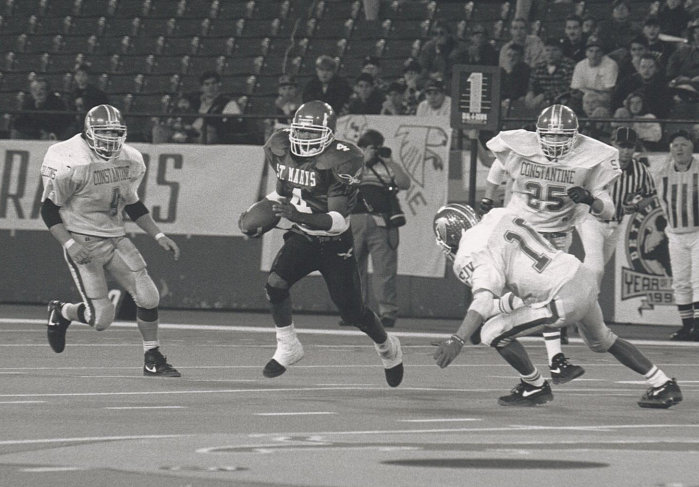 Sweetland, who moved to Constantine in 1916 to take over his brother's medical practice after the latter was killed in a car crash, reportedly allowed patients to work off their medical bills by helping with the stadium's construction.
Sweetland, who moved to Constantine in 1916 to take over his brother's medical practice after the latter was killed in a car crash, reportedly allowed patients to work off their medical bills by helping with the stadium's construction.
Constantine, which played its first football game in 1924 and finished as county champs at 4-2 under coach Lew Lake, sports an all-time record of 481 wins and 221 losses with 11 ties. During that span, the Falcons have enjoyed 11 unbeaten seasons, including Robert Finlay's 1937 squad that went 8-0 and was unscored upon.
Coaching longevity is one of the biggest factors allowing Constantine to be as successful as it has been, especially during the program's modern era. The Falcons have had just four head coaches since 1964.
Mike Messner, a three-sport athlete and 1965 Constantine graduate, later served as the school's athletic director from 1992-2016.
Messner pointed to Meredith 'Spud' Huston, Constantine's football coach from 1958-1961, as one of the first individuals influential in setting the wheels in motion for the program's future success.
Huston guided the Falcons to their first league title in 1961.
Constantine's four winningest coaches – Dave Horn, Tim Baker, Ken Rimer and Shawn Griffith – are all honorary members of the Michigan High School Football Coaches Association's Hall of Fame.
Horn, who died earlier this summer, served two stints as Constantine's head coach from 1964-1981 and 1987-1989 while compiling a 116-65-4 record.
Baker (129-30) coached Constantine for 15 seasons and guided the Falcons to a record of 129-30. Under Baker, the Falcons were Division 6 champs in 2004 and Finals runners-up in 1994 (Class CC) and 2002 (Division 5).
"Dave (Horn) was a genuinely great person who coached 21 years. He could get upset at you on the field, but he was a very kind, storyteller and a thoughtful guy who really cared about others," Messner said.
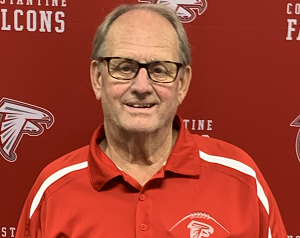 "In the modern coaching era, Tim (Baker) really believed in lifting weights, making kids stronger and developing kids into good football players. He was diligent, hardworking and put a lot of time into the program while missing a lot of family functions. He concentrated on doing the best job he could. Ken (Rimer) was right there in the same mode as Tim. When they started coaching together, they wanted a program that kids at Constantine could be proud of. Things started really happening, and ever since then the program has been strong. We have coaches who want Constantine to be successful on the field."
"In the modern coaching era, Tim (Baker) really believed in lifting weights, making kids stronger and developing kids into good football players. He was diligent, hardworking and put a lot of time into the program while missing a lot of family functions. He concentrated on doing the best job he could. Ken (Rimer) was right there in the same mode as Tim. When they started coaching together, they wanted a program that kids at Constantine could be proud of. Things started really happening, and ever since then the program has been strong. We have coaches who want Constantine to be successful on the field."
Rimer spent 28 years as an assistant coach under Baker and current head coach Shawn Griffith. Constantine compiled a win-loss mark of 242-70 with Rimer as an assistant.
Griffith, who took over as Constantine's head coach in 2005, is the Falcons’ all-time winningest coach at 156-53. Under Griffith's tutelage, the Falcons have made 17 playoff appearances, with back-to-back Division 6 runners-up finishes in 2011 and 2012.
"The history of Constantine football kind've coincides with everything else here in the community. This is my 32nd year overall as a coach in this program. But I also have several memories from when I was in high school at Mendon as a player going up against Constantine," Griffith said.
"When you talk about any community our size, you immediately look at family names. We have another Stears (Lucas) on this year's team. Mike (Messner) told me there have been over 20 from the Stears family that have worn the Falcon uniform. It doesn't stop there. I look at the number of kids we have in the locker room this year, and I realize that I've coached many of their brothers, fathers and uncles. We look at the program as one big family. This program has helped to raise a lot of young men in the area these last few years. The community has been extremely supportive of the program as well."
Constantine won 19 league championships as a member of the St. Joseph Valley League from 1952-2007. That league consisted of Constantine, White Pigeon, Schoolcraft, Centreville, Colon, Climax-Scotts, Burr Oak and Mendon. Bronson and Battle Creek St. Philip became members later after Climax-Scotts and Burr Oak left to join the Southern Central Athletic Association. Eventually, the SJV disbanded due to conference realignment and declining enrollment among its smaller schools.
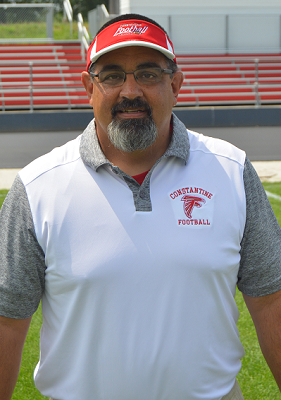 At one time, Constantine played in one of the longest-running rivalries in state football history. The Falcons and archrival White Pigeon began playing one another in 1924 and Constantine held a 47-35-6 in the rivalry, with wins in the final 17 meetings before the series ended after the 2007 season.
At one time, Constantine played in one of the longest-running rivalries in state football history. The Falcons and archrival White Pigeon began playing one another in 1924 and Constantine held a 47-35-6 in the rivalry, with wins in the final 17 meetings before the series ended after the 2007 season.
Messner recalls the 1981 meeting between White Pigeon and Constantine as one of the most memorable. The game was played at the Sweetland Stadium in Constantine, and there were more than 5,000 people in attendance.
"White Pigeon came into that game unscored upon and ranked No. 1 in the state. We were undefeated, but nobody was saying anything about us, but they were really talking (White Pigeon) up," Messner said. "(White Pigeon) had brought over 1,000 balloons with them and hid them behind the bleachers. They were going to launch them every time they scored. They never scored, and we beat them 21-0. It was such a sad moment for both schools when they had to stop playing one another in football."
After the SJV dissolved, Constantine and Schoolcraft became members of the Kalamazoo Valley Athletic Association from 2008-2014 before leaving to join the Southwestern Athletic Conference for the 2015 season. Constantine begins its ninth season competing in the SAC Lakeshore against the likes of Watervliet, Allegan, Kalamazoo United, South Haven and Parchment.
Messner also lists several playoff games as big moments in Constantine's football history.
"Our first playoff team (1991) was a big year, and our first state finals appearance (1994) was another," Messner added.
Constantine lost to Orchard Lake St. Mary's (35-7) in the 1994 Class CC Final, but knocked off heavily-favored Fennville (50-0) in their Pre-Regional and Whittemore-Prescott (54-6) in a Semifinal to get there.
"Both teams were considerably bigger than us up front on the line. Fennville had a really good quarterback (Frank Alfieri) and Whittemore-Prescott had a great tailback (Tom 'Touchdown' Tyson) that our much smaller guys managed to shut down," Messner said. "Then there was a 13-7 win we had in the 2002 Regional Finals over heavily-favored Muskegon Oakridge."
But perhaps the 2004 Semifinal deemed 'The Miracle in Marshall' will go down as the most memorable game in Constantine history. In that contest, Constantine trailed Monroe St. Mary Catholic Central 27-14 with a little more than six and a half minutes to go in the fourth quarter.
The Falcons scored twice during those last few minutes, including a last-second 32-yard TD pass from Aaron Baker to Sean Wolf caught in the end zone that tied the game at 27-27 with one second left. Jordan Williams booted the PAT as time expired, giving the Falcons a 28-27 win.
Constantine went on to defeat Suttons Bay 34-13 in the Division 6 Final the following week.
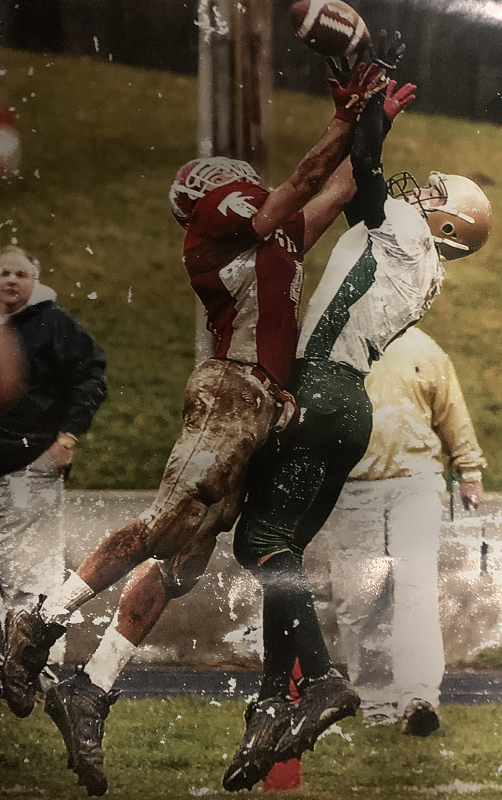 From 1991-2015, Constantine attained at least seven wins for 25 consecutive years, which is a state record. The Falcons made 18 consecutive playoff appearances from 1999-2016 before suffering their most recent losing season in 2017, when they finished 3-6.
From 1991-2015, Constantine attained at least seven wins for 25 consecutive years, which is a state record. The Falcons made 18 consecutive playoff appearances from 1999-2016 before suffering their most recent losing season in 2017, when they finished 3-6.
Constantine's overall playoff record stands at 49-25 with 26 total appearances.
It was Griffith, who played his high school football at Mendon for Class D championship-winning coach Roger Smith and his then-assistant John Schwartz (who would later lead the Hornets to 10 more Finals titles) who convinced Baker the Falcons should transition from the I-Formation to the Wing-T offense.
After much discussion and argument among the coaching staff, Baker reluctantly agreed to Griffith's idea.
"I joined the coaching staff in 1992 as offensive coordinator. As a coaching staff, we really came into our own and made our first run to the Finals in 1994. In the late ’90s we had some really good teams, but still didn't quite have a real identity. During that time we ran into some really good Wing-T football teams," Griffith said.
"We started noticing that we had a real hard time stopping these teams that ran the Wing-T like Muskegon Orchard View, Hopkins and Battle Creek Pennfield. So I came to Tim (Baker) after the 2001 season with the idea of changing the offense. We knew we had a tremendous group of running backs coming up through the program for the next seven or eight years. I approached him about running the Wing-T. He wasn't real receptive at first about running it. But after sitting down with other Wing-T coaches like John Shilito (Muskegon Orchard View) and Irv Sigler (Belding), he agreed to give it a try."
Constantine began running the Wing-T at the start of the 2002 season.
"Once you get known for running an offense like this, it kind've becomes your niche. I get emails from people all over the United States wanting me to come teach them this offense at camps. Here at Constantine, we've been fortunate to rack up quite a few wins since we installed this offense. Our kids can really talk the Wing-T game, and we didn't really have that before when we were running our I-formation and single-back stuff," Griffith said.
"The blocking schemes have become ingrained in our kids. They do a great job of knowing where they are supposed to be and who they are supposed to block. Another thing I really like about the Wing-T is it's a lineman's offense. Our linemen get a lot of credit, which they deserve. There is a certain toughness to this offense as well. It's allowed us to use kids who might be smaller and less athletic, but still allows us to be successful because they have developed a certain toughness."
Griffith credits a lot of that toughness to his players who compete on the Falcons' wrestling team during the winter sports season. Constantine’s wrestling program also has enjoyed a long run of success, including a Class C-D title in 1993 and Division 3 runner-up finish in 2002. The Falcons have won Team Regional titles three straight seasons.
 Scott Hassinger is a contributing sportswriter for Leader Publications and previously served as the sports editor for the Three Rivers Commercial-News from 1994-2022. He can be reached at [email protected] with story ideas for Berrien, Cass, St. Joseph and Branch counties.
Scott Hassinger is a contributing sportswriter for Leader Publications and previously served as the sports editor for the Three Rivers Commercial-News from 1994-2022. He can be reached at [email protected] with story ideas for Berrien, Cass, St. Joseph and Branch counties.
PHOTOS (Top) Constantine players celebrate near the end of their 2004 championship win at Pontiac Silverdome. (2) A trio of Constantine defenders pursue Orchard Lake St. Mary’s Phil Martin (4) during the 1994 Class CC Final. (3) Longtime Constantine athletic director Mike Messner. (4) Current Constantine head varsity coach Shawn Griffith. (5) The 2004 “Miracle in Marshall” remains one of the most memorable games in Constantine football history. (Finals photos from MHSAA archive. “Miracle in Marshall” photo by Dick Carter. Messner and Griffith photos gathered by Scott Hassinger.)

